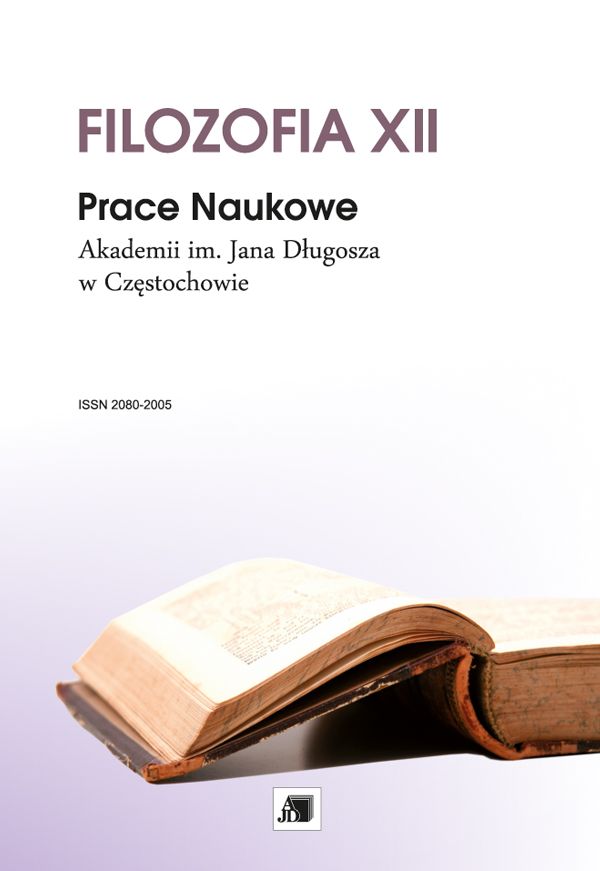Ciało w posthumanistycznej teorii podmiotowości dwuwymiarowej autorstwa Elizabeth Grosz
The Corporeality in Elizabeth Grosz’s Posthumanistic Theory of Two-Dimensional Subjectivity
Author(s): Agnieszka JagusiakSubject(s): Philosophy, History of Philosophy
Published by: Uniwersytet Jana Długosza w Częstochowie
Keywords: Elizabeth Grosz; corporeality; posthumanistic theory
Summary/Abstract: Elizabeth Grosz – a philosopher and the third-wave feminist who is involved in postmodernism thought as well, cretes a posthumanistic theory of embodied subjectivity which can be understood as a critique those discourses of identity that wishing to recognize the subjectivity of the human as a category that is shaped in an essentialist mode in which is excluded a very important component of subjectivity – the body and the corporeality. The author of Volatile Bodies develops a new concept of subjectivity which is an alternative to the previous ideas and takes into account two elements in defining the subject – reason/psyche/ consciousness (“internal” dimension of subjectivity) and the body/corporeality (“external dimension”), stipulating that these two dimensions of subjectivity have to permeate each other and enter in mutual interaction necessarily.In the philosophy of Grosz body or corporeality is a source of meaning, it is a major point in the construction of subject identity. Precisely, from body itself starts perceiving the whole world i.e., everything what is experiencing from the world is filtered through the entity’s body. On the body are stored all experiences that entity sustained, simultaneously, the corporeality is the way in which every human conveys its self-reflection about the reality that surrounds she or he. In her works Grosz strongly indicates that the body belongs to an entity (subject is body itself) is its integral part, the body is not a separated mechanism whose sole responsibility is to keep an entity alive.Elizabeth Grosz – filozofka działająca w ramach III fali feminizmu, a także w oparciu na dogmatach postmodernizmu, stworzyła posthumanistyczną teorię podmiotu ucieleśnionego, która może być odczytywana jako krytyka tych dyskursów tożsamościowych, które chciałyby ujmować podmiotowość człowieka jako kategorię kształtowaną na sposób esencjalistyczny, przy opisywaniu której wyklucza się bardzo ważny składnik tejże, jakim jest ciało i cielesność człowieka. Autorka Volatile Bodies tworzy nową koncepcję podmiotowości, która ma stanowić alternatywę dla poprzednich koncepcji i uwzględniać dwa elementy – duszę (wymiar wewnętrzny podmiotowości) i ciało (wymiar zewnętrzny) w zdefiniowaniu podmiotu, zastrzegając, iż te dwa wymiary podmiotowości z konieczności muszą się przenikać, wchodzić we wzajemną interakcję. W filozofii Grosz ciało jest źródłem znaczeń, stanowi główny punkt w konstruowaniu tożsamości podmiotu. Właśnie od ciała podmiot zaczyna percypowanie świata, tzn. wszystko, co jednostka przeżywa, czego doświadcza od świata, jest filtrowane przez ciało. Na ciele są zapisywane wszelkie doświadczenia, jednocześnie ciało niejako stanowi środek do transportowania autorefleksji podmiotu na świat. Grosz w swych pracach stanowczo zaznacza, że ciało należy do podmiotu (a właściwie ciało jest podmiotem) i jest jego integralną częścią, nie jest odseparowanym mechanizmem, którego zadaniem jest tylko utrzymywanie podmiotu przy życiu.
Journal: Prace Naukowe Akademii im. Jana Długosza w Częstochowie. Filozofia
- Issue Year: XII/2015
- Issue No: 12
- Page Range: 153-165
- Page Count: 13
- Language: Polish

